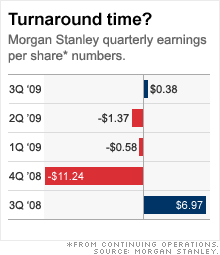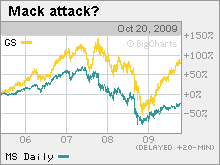Morgan Stanley back in black
After three consecutive losses, Morgan Stanley posts its first quarterly profit in a year as its CEO prepares to depart.

 |
| Morgan Stanley shares have bounced back this year but lag far behind those of rival Goldman. |
NEW YORK (Fortune) -- Morgan Stanley posted its first quarterly profit in a year.
The New York-based investment firm said Wednesday it earned $757 million, or 38 cents a share, for the third quarter. That's down sharply from the year-ago profit of $7.7 billion, or $7.38 a share. But it was much better than the 30 cents per share profit that analysts surveyed by Thomson Reuters were expecting.
Revenue fell to $8.7 billion from $18 illion a year earlier. Revenue at the global wealth management unit nearly doubled, to $3 billion, but revenue at the institutional securities business plunged 69% to $5 billion.
The firm, which has been focusing on building the global wealth business, said its investment banking business was strong, but revenue at two trading units was hit by accounting charges tied to the increasing value of the firm's debt as credit markets strengthened.
"Morgan Stanley continued to build momentum across our business this quarter, as we made important progress in executing key strategic initiatives," CEO John Mack said.
The results pleased investors who had been nervous heading into Wednesday morning, given the firm's poor results in recent quarters. Since the old Wall Street melted away last fall, Morgan Stanley (MS, Fortune 500) had posted three straight quarterly losses totaling $13 billion.
"We expect this to be somewhat of a relief and the stock to do relatively well," Deutsche Bank analyst Michael Carrier wrote in a Wednesday morning note to clients.
Carrier added that while the company has "more work to do," he is pleased with the progress. He said that gains in fixed-income trading revenue and merger-and-acquisition advisory income were both positives.
Morgan Stanley shares rose 6% in midmorning trading to $34.61.
Like other Wall Street titans, Morgan suffered the consequences of loading up on risk during the credit bubble earlier this decade. But unlike some rivals, Morgan has missed out on much of the trading rally that fueled this year's banking revival.
Now Morgan is trying to remake itself. Earlier this year, it and Citigroup (C, Fortune 500) set up a global wealth-management joint venture that they said would have 18,500 brokers and 6.8 million customers. On Tuesday, the firm agreed to sell retail asset-management units -- including Van Kampen Investments -- to investment manager Invesco (IVZ).
But the highest-profile change took place last month, when CEO John Mack said he would step aside. Mack had returned in 2005 to run the firm four years after he was shoved aside in a clash with then-chief Phil Purcell.
James Gorman, who has been head of the wealth management business, will take over Jan. 1.
Though Mack earned plaudits for steering Morgan Stanley through last year's financial maelstrom, the firm's stock has dropped 18% since June 30, 2005, when Mack took the reins.
Over the same period, shares of Goldman Sachs (GS, Fortune 500) have risen more than 80%. Goldman is the lone Wall Street rival that's still standing, after Lehman Brothers and Bear Stearns collapsed and Merrill Lynch was absorbed by Bank of America. (BAC, Fortune 500)
By the same token, by missing out on massive profits, Morgan Stanley has managed to sidestep much of the fervor over Wall Street pay spurred by Goldman's giant bonus pool.
Goldman said last week it has set aside $16.7 billion this year to pay its workers -- which puts it on track to match its record 2007 bonus payout.
Because of Morgan Stanley's poor performance in recent quarters, it is apt to churn out much less impressive compensation figures. So far in 2009, Morgan Stanley has set aside $10.9 billion for employee pay -- down 9% from a year ago.
Still, because investment banks on Wall Street typically hand out half their revenue in pay, Morgan Stanley workers are hardly going hungry.
A July report from the New York attorney general's office noted that Morgan earned $1.7 billion last year -- but paid out $4.8 billion in bonuses and also took $10 billion in bailout money from the Treasury. It repaid those loans in July. ![]()
-
 The retail giant tops the Fortune 500 for the second year in a row. Who else made the list? More
The retail giant tops the Fortune 500 for the second year in a row. Who else made the list? More -
 This group of companies is all about social networking to connect with their customers. More
This group of companies is all about social networking to connect with their customers. More -
 The fight over the cholesterol medication is keeping a generic version from hitting the market. More
The fight over the cholesterol medication is keeping a generic version from hitting the market. More -
 Bin Laden may be dead, but the terrorist group he led doesn't need his money. More
Bin Laden may be dead, but the terrorist group he led doesn't need his money. More -
 U.S. real estate might be a mess, but in other parts of the world, home prices are jumping. More
U.S. real estate might be a mess, but in other parts of the world, home prices are jumping. More -
 Libya's output is a fraction of global production, but it's crucial to the nation's economy. More
Libya's output is a fraction of global production, but it's crucial to the nation's economy. More -
 Once rates start to rise, things could get ugly fast for our neighbors to the north. More
Once rates start to rise, things could get ugly fast for our neighbors to the north. More







